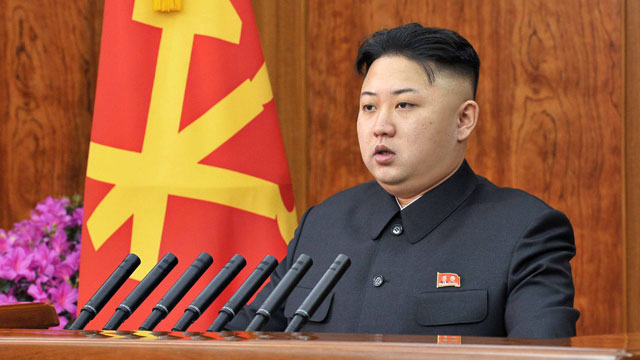
North Korea is reported to have conducted a submarine-launched ballistic missile test on 23rd April described it as a ‘great success’. ‘It fully confirmed and reinforced the reliability of the Korean-style underwater launching system and perfectly met all technical requirements for carrying out underwater attack operation,’ the North Korean news agency KCNA said adding that the test gave the country ‘one more means for powerful nuclear attack’ releasing a picture of the alleged submarine missile test the day next. The United Nations condemned the test as a ‘serious violation’ of past resolutions aimed at curbing the North’s nuclear ambitions. The country’s leader Kim Jong-un observed from a test facility as the ballistic missile spewed out a ‘massive stream of flames’ while soaring into the sky. Claimed to have been fired from submarines, it could rather be from submerged platforms from an unspecified location but South Korean locates it to the eastern coastal town of Sinpo. International sanctions have been stepped up in the wake of several controversial nuclear and missile tests by the North- the latest being on 23rd April- with the North claiming to have used ‘cold launch’ technology to fire a missile from a submarine, where it is expelled using gas pressure. Within a span of a decade North Korea has conducted four nuclear tests – the first one in October 2006 and the latest hydrogen bomb test in January, 2016 – that sparked worldwide condemnation. UN sanctions banning North Korea from conducting nuclear tests or using ballistic missile technology dates back to 2006when the UN Security Council imposed its strongest sanctions . In March, 2016 North Korea claimed to have developed nuclear warheads small enough to fit on ballistic missiles, although the claims are doubtful. It may be gearing up for a fifth test as a show of strength ahead of the North Korean Workers’ Party Congress in May, the first such meeting since 1980 to cement leader Kim Jong-un’s vice-like grip on power. North Korea’s Foreign Minister Ri Su-yong defended his country’s right to have a nuclear deterrent and blamed that the US drove North Korea to develop such weapons as an act of self-defense. If offered to suspend its nuclear tests provided the US stopped its annual military exercises with South Korea which could open the door to talks and reduced tensions. This rare interview by a top North Korean official with a foreign media outlet and the ensuing conversation took place in the country’s diplomatic mission at the UN. ‘If we continue on this path of confrontation, this will lead to very catastrophic results, not only for the two countries but for the whole entire world as well. Stop the nuclear war exercises in the Korean Peninsula, then we should also cease our nuclear tests. It is really crucial for the United States government to withdraw its hostile policy against the DPRK and as an expression of this stop the military exercises, war exercises, in the Korean Peninsula. Then we will respond likewise,’ said Ri signaling that North Korea would not back down despite current sanctions imposed by the US and allies. Annual military drills conducted by the US and South Korea routinely inflames tensions with the North. US defends the drills for demonstrating Washington’s commitment to its alliance with Seoul insisting North to give up nuclear weapons program first before any negotiations. It has ignored similar proposals in the past. On 24th April Obama revealed the US has not taken seriously the offer made by Ri in a rare interview and that Pyongyang would ‘have to do better than that’. Ri was defiant that sanctions would not sway his country: ‘If they believe they can actually frustrate us with sanctions, they are totally mistaken. The more pressure you put on to something, the more emotionally you react to stand up against it. And this is important for the American policymakers to be aware of.’ Leader Kim Jong Un threatened that the North was now capable of ‘hitting the heads of the South Korean puppet forces and the US imperialists anytime as it pleases’. With rogue states like China and Pakistan forming an axis in South Asia, and China standing solidly behind Pakistan in its use of terror as an instrument of state policy, nuclear conflagration is a distinct possibility. Chinese support to North Korea provides another serious nodal point for disturbing peace in the region.



